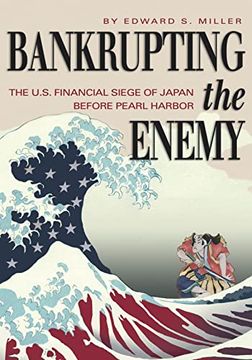Share
Bankrupting the Enemy: The U. S. Financial Siege of Japan Before Pearl Harbor (in English)
Edward S. Miller
(Author)
·
US Naval Institute Press
· Paperback
Bankrupting the Enemy: The U. S. Financial Siege of Japan Before Pearl Harbor (in English) - Miller, Edward S.
$ 15.37
$ 21.95
You save: $ 6.59
Choose the list to add your product or create one New List
✓ Product added successfully to the Wishlist.
Go to My WishlistsIt will be shipped from our warehouse between
Monday, June 03 and
Tuesday, June 04.
You will receive it anywhere in United States between 1 and 3 business days after shipment.
Synopsis "Bankrupting the Enemy: The U. S. Financial Siege of Japan Before Pearl Harbor (in English)"
Award-winning author Edward S. Miller contends in this new work that the United States forced Japan into international bankruptcy to deter its aggression. While researching newly declassified records of the Treasury and Federal Reserve, Miller, a retired chief financial executive of a Fortune 500 resources corporation, uncovered just how much money mattered. Washington experts confidently predicted that the war in China would bankrupt Japan, not knowing that the Japanese government had a huge cache of dollars fraudulently hidden in New York. Once discovered, Japan scrambled to extract the money. But, Miller explains, in July 1941 President Roosevelt invoked a long-forgotten clause of the Trading with the Enemy Act of 1917 to freeze Japan s dollars and forbade it to sell its hoard of gold to the U.S. Treasury, the only open gold market after 1939. Roosevelt s temporary gambit to bring Japan to its senses, not its knees, was thwarted, however, by opportunistic bureaucrats. Dean Acheson, his handpicked administrator, slyly maneuvered to deny Japan the dollars needed to buy oil and other resources for war and for economic survival. Miller's lucid writing and thorough understanding of the complexities of international finance enable readers unfamiliar with financial concepts and terminology to grasp his explanation of the impact of U.S. economic policies on Japan. His review of thirty-seven studies of Japan's resource deficiencies begs the question of why no U.S. agency calculated the impact of the freeze on Japan's overall economy. His analysis of a massive OSS-State Department study of prewar Japan clearly demonstrates that the deprivations facing the Japanese people were the country to remain in financial limbo buttressed its choice of war at Pearl Harbor. Such a well-documented study is certain to be recognized for its significant contributions to the historiography of the origins of the Pacific War.
- 0% (0)
- 0% (0)
- 0% (0)
- 0% (0)
- 0% (0)
All books in our catalog are Original.
The book is written in English.
The binding of this edition is Paperback.
✓ Producto agregado correctamente al carro, Ir a Pagar.

